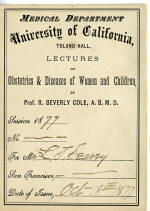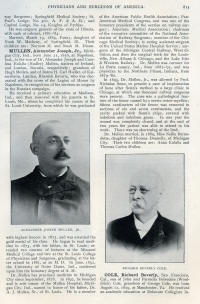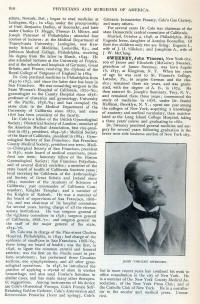AMERICAN MEDICAL ASSOCIATION.
Annual Meeting, Held in
Atlanta, Ga., May 5, 6, 7
and 8, 1898,
E. Beverly Cole, M.D., President, in the Chair.
The opening session of the forty-seventh annual meeting of the American Medical Association was called to order by the President, Dr. R. Beverly Cole, of San Francisco, at 10:30 A.m. After a prayer by Rev. Dr. McDonald, the address of welcome on behalf of the medical profession of Atlanta was delivered by Dr. F. M. Ridley.
The report of the Committee of Arrangements was then read by Dr. Westmoreland, after which came the President's address.
The President, R. Beverly Cole, M.D., of San Francisco, Cal., after a graceful and elegant acknowledgement of the honor conferred on him of Vice-President of this Association fifteen years ago in the city of Atlanta, and the additional duties and responsibilities of his present position, gave a thoughtful consideration to the following subjects: Lowering of the Standard of the Profession; Cut-rate Insurance Examinations; Foreign Practitioners in the United States; Th« Twelfth International Congress; Clerical and Medical Endorsements of Proprietary and Patent Medicines; and Unjustifiable Operations. His address elicited frequent manifestations of approval.
A memorial was presented from the Medical Association of the District of Columbia, praying that the American Medical Association take action to prevent the passage of a bill now before Congress prohibiting vivisection in the district. It this passed it would close the biological laboratories in the district, including those of the army, navy, and marine hospitals service, and would prevent all serious medical research in Washington.
Founding Medical Department of University of the Pacific 1858
For Elias Samuel Cooper the year of 1858 was truly the worst of times. We have already seen the misfortunes he endured in that year. He narrowly escaped expulsion from the State Society by a hostile clique of San Francisco physicians. Furthermore, these same forces of conspiracy and betrayal later instigated the Hodges' malpractice suit as a more certain means whereby to administer a coup de grāce to the "presumptuous" Cooper.
Adversities such as these, augmented as they were by failing health, could scarcely fail to break the spirit of a man. Yet even in the shadow of such threatening conditions, Cooper's master plan continued to unfold and in 1858 his ultimate goal was achieved. He founded a medical school. In the light of this achievement, the year of 1858 was also for him the best of times.
Over the previous three years Cooper had developed his Pacific Clinical Infirmary, a capacious building of several stories in downtown San Francisco on Mission Street between Second and Third Streets, into a mini-medical center. Facilities comprised an ambulatory clinic, hospital beds, an operating room, anatomy and animal surgery laboratories and, on the top floor, a large room for lectures and demonstrations. There were doctors' offices, living quarters for the matron, and doubtless for himself as well. Not only did Cooper encourage the attendance of local and visiting doctors at his clinics and operations in the Infirmary for teaching purposes, but he also conducted there an ongoing series of formal courses of anatomical and surgical lectures and demonstrations. These he had initiated and advertised widely within a few months of his arrival on the Coast in 1855.
As participants in his clinical and laboratory teaching exercises, he co-opted a select-few able physicians who shared his interests in medical education and enthusiastically participated in his programs. Among these were Dr. Beverly Cole who lectured at the Infirmary and Dr. James Morison who rented an office in the Building. Both later became professors in the new school To complete the small inner circle of confidants to be included in his plan to found a medical school, Cooper chose Dr. Isaac Rowell. During the summer of 1858, in the lull between the State Society meeting in February and the malpractice trial in November, Cooper and his three colleagues, their confidence in him unshaken, defined their strategy for implementing the plan. They agreed to act on it promptly without awaiting the outcome of the Hodges suit.


